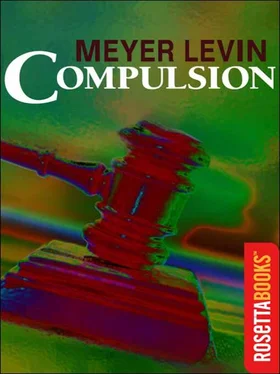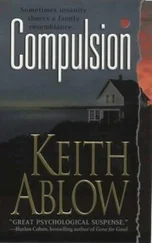Willie had fallen silent, brooding over his only partial explanation of Judd, an explanation which he was to complete for me, in an extraordinary way, years later. I turned the pages. “What about Artie?”
“It’s either obvious or a complete mystery,” he said. “Maybe he’s just a born maniac.”
“You think it could be heredity, then, after all?”
Willie didn’t believe it was entirely the fault of heredity. If these weaknesses had been detected early, perhaps the new psychiatry could have helped. But why hadn’t the faults been detected? “Ah, we don’t know a damn thing.” He had become morose.
“One thing you did guess,” I said, to restore the spark in him. “About the weapon.” I told him it was his insistence about the chisel that had led us to the tales of other taped chisels, other crimes.
Willie looked at me foggily for a moment. “For crissake, that wasn’t what I meant at all.” Though he wouldn’t be surprised if other such murders had been done. “Don’t you see what it is? The chisel? The tool itself? What it represents?”
Nowadays we would say I must have been blocked in some way, not to have understood instantly. As he made an obscene gesture with his hand, it dawned on me. It seemed at once weird, far-fetched, and obviously true. I felt stupid, too stupid to ask the next question.
He did it for me, rhetorically. But why should Artie have had to kill people with that thing? And why only men? For Artie had been against Judd’s idea to make it a girl, the report told us.
In Artie’s case, too, Willie said, it was the relationship with the father that had to be studied. The very first lines about Artie said material had been obtained from his mother, brothers, uncle. “His father still keeps absolutely shut off,” Willie observed. “Upstairs, they’ve been trying to get a show of support, you know, for the public. They finally got his mother to say something, but not the old man.”
We read, “The grandfather, a quick, alert man, was abusive to his children and beat them severely. The patient’s father has been exactly the opposite in his treatment of his children, probably as a reaction to the excessive severity of the grandfather.” Willie pointed out a passage, under Artie’s sex life. When Artie had caught gonorrhoea, “he sought advice from his older brother and his uncle, being particularly desirous of keeping a knowledge of all this from his father, whose respect he wanted to maintain”.
“Almost any kid would have done something like that,” I said.
“The patient had no sex knowledge from his parents, from his brothers, from his governess. At one time, he did secure some information from the family chauffeur…”
Then Willie found a clue. In the year Artie’s little brother was born, and Artie had begun his crime fantasies, he “had some eye trouble, and his lids would tend to stick together for a period of several weeks”. The next detail Willie pounced upon – the eye trouble had returned over a month ago, the time of the murder.
“I don’t see-”
“You don’t see! That’s just it. He didn’t want to see. To see that baby brother, or, years later, to see the crime he had done.”
Now I recalled Willie’s question in the lab: Whom did each boy mean to kill? Was it his little brother, then, for Artie? Hadn’t Artie and Judd actually discussed taking Billy as their victim?
But why? Merely jealousy of a kid brother?
It all went somehow into a sense of inadequacy, Willie argued, a sense as a child of not being wanted enough – or else why would the parents have another baby? Wasn’t Artie still undeveloped, despite his great hurry to grow up? “At eighteen, his voice is still changing”, the report read. “He is retarded in his masculine development.” He hardly needed to shave. His sexual growth was delayed. “To cover up his relative impotence, he boasted of his marks at school; although he received only moderate grades. He convinced his friends that he was quite superior to them mentally…”
Impotence? Artie, the sex braggart? But of course, that would fit. For what did we really know of his conquests? Hadn’t he always let on that Myra was his mistress? And I was certain she was a virgin.
The answer to Artie was all in there, somewhere, Willie said. The violent jealousy over his baby brother, and then the shame at being somewhat impotent – all his angers and frustrations bringing a kind of rage of impotence that was expressed the way a kid would. “I’ll show you!” With a hard tool he would knock over, kill, all those who made him feel insignificant – kill that rival kid brother who was so cute and beloved. And kill his own inadequate self.
The tool – wasn’t it the absolute symbol, the murderous weapon feared and dreamed of by every little boy, who in his fantasies about adults sees it somehow as a dreadful, powerful, killing thing?
Evasively, feeling uncomfortable, I asked about the other fantasies of Judd and Artie, the daydreams or whatever they were -
“You mean the masturbation dreams?” Willie said.
I pretended that I had myself understood them as such.
“They’re wishes. Judd wished most of all to be Artie’s slave, so he became it, and Artie wished to become a master criminal and get caught and jailed.”
But even with all this inner compulsion, weren’t they both persons of intelligence, exceptional intelligence? Could they not have seen where they were being driven?
“Look,” he said, “in both cases, the reports show us, the emotional age and the intelligence age are out of kilter. Even the psychological tests showed they were emotionally still children. What’s the emotional reaction of a kid of nine when he’s mixed up, baffled? He’ll strike out, blindly-”
“But it wasn’t blind killing. It was a long cunning plan,” I objected.
“Won’t a kid brood like that and plan? And then do something violently impulsive? They planned – and then picked up a kid impulsively.”
He read again of Artie’s moods, his depressions, his declaration that he had at times contemplated suicide. “The patient has some insights into his peculiarities and says that the question has often come to him as to whether he was ‘all there’. He states that during the past year he has felt different; he feels he cannot concentrate so well, that his memory is not so good, and that he cannot carry on conversations and small talk with others as formerly…
“In our opinion this tendency will continue and increase so that he will become more and more wrapped up in his world of fantasy and less and less in contact with his world of reality.”
For the family, the report was reassuring: “There is no reason to feel that the patient’s condition is of a hereditary nature or that it will be transmitted to future generations of his siblings or relatives. Neither is there any reason to feel that the family is responsible in any way for this boy’s condition.”
Willie was restless. Responsible . He tasted the word.
“According to you,” I said, “no one is responsible.”
“I didn’t say that.” He threw change on the table. “I suppose you think ignorance is no excuse?” We got up.
I was too excited to go to bed. I walked alongside the lake, ignoring all the entwined couples on the grass, in cars. And as I walked, there grew in me that peculiar elation that comes to us when we are young men, eighteen, twenty – that mystical sense of infinite creative connection to the universe, that winy sense of godlike power. And this, I then knew, was what that poor, tragic Judd must have felt at times, this elation, this intoxication with his own mental powers, and this was what he had confusedly expressed in his ideas that man was even more than God, that man conceived God and hence was greater than God. Each being in his own being was God. I felt the same thing in myself, and that night I felt even larger, larger with pity.
Читать дальше












